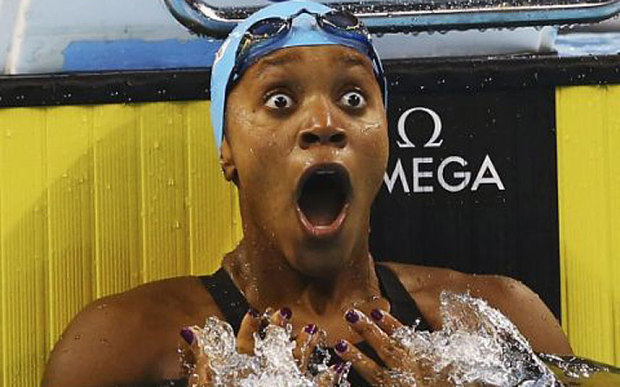Black swimmers take the stage
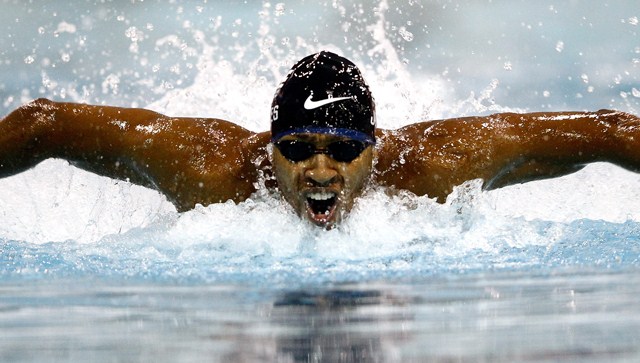
BY PETER SESAY
Blacks have largely dominated the world of sports in almost every compartment over the ages. The long list of black sporting legends includes Jesse Owens, the four-time gold medalist track and field champion of the mid-1930s; Muhammad Ali, Pele, Tiger Woods, Michael Jordan, Usain Bolt, Serena Williams and so many others in innumerable specialties except swimming where, for a long time, two-time Olympic swimmer and gold-medalist Cullen Jones of the United States was the sole black star. But swimming, too, is now becoming a black thing.
The best-known African American figure in swimming today is Cullen Jones who, in 2005, became the first man of African descent to win a gold medal at the World University Games in the 50 free. The following year, he became the first African American man to break a world record at the Pan-Pacific Games in the 4 x 100 free relay, also being credited with the fastest time in the world. Jones, now 35, is probably most remembered for upsetting the heavily-favored French team by setting both world and Olympic records at the Beijing Olympic Games in 2008. Then, at the 2012 Summer Olympics held in London, he won silver medals in the 4 x 100-meter freestyle relay and the 50-meter freestyle, as well as the gold in the 4 x 100-meter medley.
But there were quite a few pioneers of African descent before Jones. That included Anthony Nesty, 51, a native of Trinidad and Tobago, who was the first black swimmer to win an Olympic gold medal in swimming, and this happened at the Seoul Olympic in 1998. The trail-blazer was later inducted into the International Swimming Hall of Fame.
New stars are now increasingly coloring swimming black after the dominance of the above-mentioned trailblazers. Nigerian-born British TV presenter Andy Akinwolere in 2011 set two world records for swimming in one of the deepest stretches of water on earth, the Palau Trench, an 8,000-meter deep abyss in the Pacific Ocean. The 36-year-old outspoken Akinwolere, whose record was verified by the World Open Water Swimming Association, is the first person to swim across the deepest part of the trench. His achievement is all the more impressive as nothing in his earlier life had prepared him for this. Akinwolere writes about his experience: “Growing up, I had no black swimming role-models to follow, and my parents didn’t encourage me to swim.”
He adds:
“Since learning how, and going on to earn a world record in the sport, I have become one of only three black swimmers to hold that honour. In a world where the black population excels at many sports, their absence from the annals of swimming history is baffling. One cannot but ask why.”
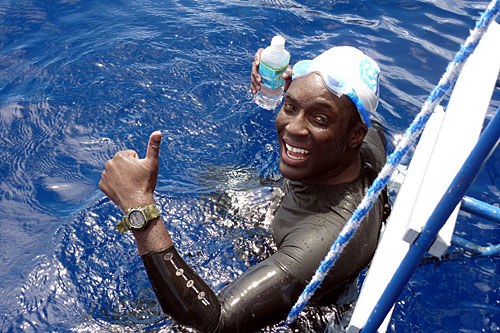
Indeed, blacks represent a small percentage of athletes in swimming just as do other minorities. According to USA Swimming research, seventy percent of black children and sixty percent of Hispanic/Latino children cannot swim. That compares to 40 percent for white children. The lack of access to swimming pools is one of the main factors that account for blacks’ hitherto low participation in the sport. Cullen Jones explains: “You’ve got places in the inner city where they have pools, but the pools are dry.” Jones also complains:
“You’ve got pools that are underutilized, they’re shutting down pools because they don’t have the money to keep them up. It’s just not as important to people as it needs to be. […] Cultural norms that steer blacks toward other sports are another factor. Lack of parent initiation in the sport is a third.”
But blacks’ interest in swimming has been rising over the past few years. From 2004 to 2015, according to the USA Swimming Foundation, USA Swimming athlete membership increased by 45 percent overall, while the African American membership rose by a higher 45 percent, propelling black swimmers into the number one positions in many contests.
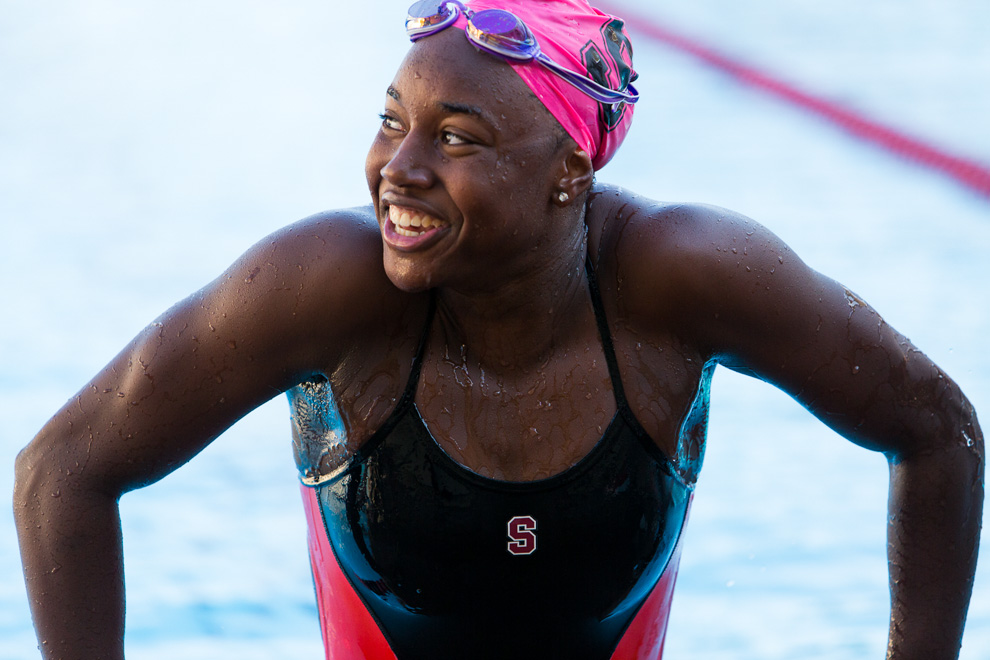
In March 2015, three African American young swimmers, Simone Manuel, Lia Neal and Natalie Hinds made history by sweeping the three top places (coming respectively 1-2-3) in the 100-yard freestyle at the NCAA championships. Then, at the 2016 Rio Olympics, Simone Manuel won two gold and two silver medals: gold in the 100-meter freestyle and the 4×100-meter medley, and silver in the 50-meter freestyle and the 4 x 100-meter freestyle. By winning the 100-meter freestyle, thereby tying Canada’s Penny Oleksiak, Manuel became the first African American woman to win an individual Olympic gold in swimming, and set an Olympic record and an American record.
And there is another bright (black) star by the name of Reece Whitley, a 19-year-old breastroker from Philadelphia who made the national team at the World Junior Championships in Singapore in August 2015. Named 2019 Pac-12 Men’s Swimming Freshman of the Year, he is a huge Olympic hopeful for 2020.
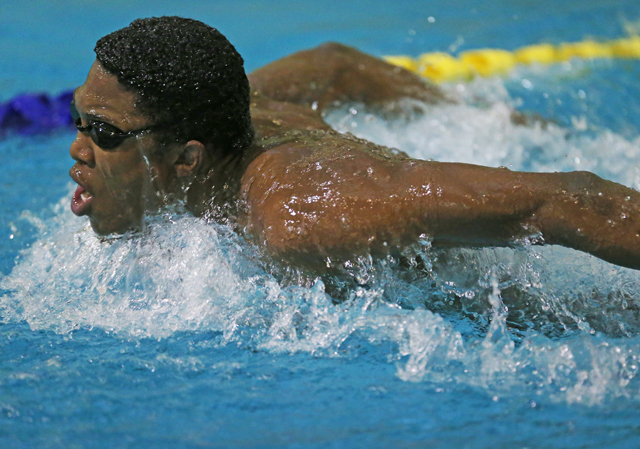
Swimmers of African descent are scoring big victories in other parts of the world, too. Jamaica’s Alia Atkinson took the world (and, indeed, herself) by surprise with her upset victory on the final stroke at the world short course swimming World Championships in the 100m breaststroke category (in Doha) on December 6, 2014 over the largely-favored Olympic champion Ruta Meilutyte of Lithuania, winner of the gold at the 2012 Summer Olympics in London. With her razor-thin victory of 0.1 seconds ahead of Meilutyte—with a 2.36 timing— the then-24-year-old Atkinson not only equaled her long-time 17-year Lithuanian rival, but also made history by becoming the first swimmer black woman, after Enith Brigitha in the 1970s, to claim a world title in the pool. Atkinson also won Jamaica’s first ever gold in world swimming championships. “I realized I was catching up so I was just trying to get a good finish,” a stunned Atkinson told the official FINA website, adding:
“I’m not used to seeing my name up in number one so it was kind of a shock, but a good one!”
